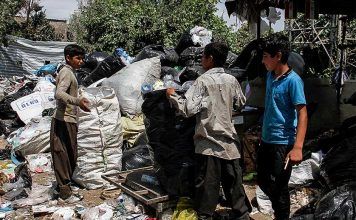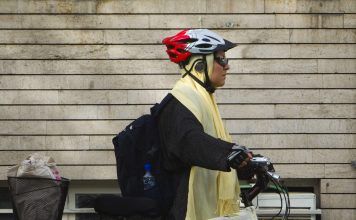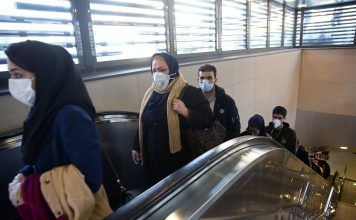By Reza Hamidi
The caretaker and the morshed (master) of Valiye Asr Zourkhaneh (‘house of strength’), a traditional all-male gymnasium in the city of Qods (province of Tehran) have been fired for allowing a few women to exercise in the central ring of the gymnasium, the Tehran-based Fararu news agency has reported.
[aesop_image img=”https://kayhanlife.com/wp-content/uploads/2020/06/elahe-razmkhah-1.jpg” panorama=”off” alt=”FILE PHOTO: Elahe Ramzkhah, an Iranian athlete in zurkhaneh. Kayhan London.” align=”center” lightbox=”off” captionsrc=”custom” caption=”FILE PHOTO: Elahe Ramzkhah, an Iranian athlete in zurkhaneh. Kayhan London.” captionposition=”left” revealfx=”off” overlay_revealfx=”off”]
The Zourkhaneh system of training, known as varzesh-e bastani (ancient sport), and its particular form of wrestling (Koshti Pahlavani), all originated during the Parthian Empire (247BC-224AD) in ancient Persia.
According to Fararu, the women and an 8-year-old girl entered the ring at Valiye Asr Zourkhaneh after the regular male members had left the gym. They exercised using the traditional Kabbadeh, also known as Kaman (bow-shaped iron weight), while observing strict Islamic dress code.
Out of respect for the women, the master played the zarb (drum), as is customary when people exercise in the ring. A few hours after, when footage showing a woman in hijab working out with a kabbadeh was posted on social media, the officials in charge of zourkhaneh sports for the Qods County and Tehran Province removed Vali Karegar, the caretaker of the Valiye Asr Zourkhaneh, as the head of the zourkhaneh sports for the city of Qods, the report said.
[aesop_image img=”https://kayhanlife.com/wp-content/uploads/2020/06/2015-04-30T000000Z_1669738933_MT1HNSLCS0009E8TB3_RTRMADP_3_HANS-LUCAS-scaled.jpg” panorama=”off” credit=”REUTERS./” align=”center” lightbox=”off” captionsrc=”custom” caption=”Men wielding wooden clubs during the traditional sport of zurkhaneh, Isfahan province, Kashan, Iran. ” captionposition=”left” revealfx=”off” overlay_revealfx=”off”]
Master Kiani, who has been working at Valiye Asr Zourkhaneh for many years, was also fired for playing the zarb while a woman exercised with kabbadeh, the report added.
“I spent 20 years at the Valiye Asr Zourkhaneh. My family and I live here,” Mr. Karegar was quoted by Fararu as saying. “Two women athletes and their husbands came to the zourkhaneh on Friday [June 12]. There were no men inside the place. My wife and daughter were also there. They asked if they could enter the building. I let them come in, given that they are athletes, and there is no ban on women entering a zourkhaneh.”
“As seen in footage posted on social media, women wore a hijab, and no one violated any rules and laws,” Karegar said. “The master played the zarb as a woman exercised with a kabbadeh inside the ring. A few hours later, the officials from the Qods County and Tehran Province fired the master and me.”
“My family and I live in this zourkhaneh. I have spent an enormous part of my life here,” Karegar noted. “Our religious leaders have explicitly said that there was no ban on women exercising at a zourkhaneh, and yet many men resist the idea. They prevent women from participating in one of the country’s oldest athletic, cultural, and religious traditions.”
“I have an 8-year-old daughter who has grown up in this zourkhaneh and is very familiar with the rules and rituals. She, as with many girls and women athletes, likes this form of traditional exercise,” Karegar explained. “There is no reason for preventing women from taking part in this activity as long as they observe the Islamic dress code. Nowadays, many women exercise at Western-style gyms and fitness centers.”
“Interestingly enough, we had tried for many years to solve a problem with the power supply at Valiye Asr Zourkhaneh, unsuccessfully. But within a few hours of the women exercising at the zourkhaneh, authorities from our electricity provider contacted us, saying they were pursuing the matter,” Karegar added.
This article was translated and adapted from Persian by Fardine Hamidi.







